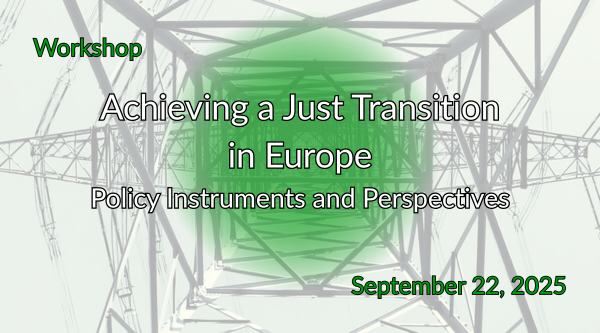
This workshop is organised by CEFRES in partnership with CNRS & the Embassy of the Republic of Poland in Prague, within the research project Contested energy transitions. Conflicts and Social innovations in big cities in the Czech Republic, France and Poland supported by the CNRS / CAS Tandem Program.
Date: September 22, 2025
Location: CEFRES, Na Florenci 3, Prague 1
Language: English
Please register at the address gilles.lepesant@cnrs.fr
Convenor: Gilles LEPESANT, Research fellow at CNRS/CEFRES (Prague)
Program
Continue reading Achieving a Just Transition in Europe: Policy Instruments and Perspectives →
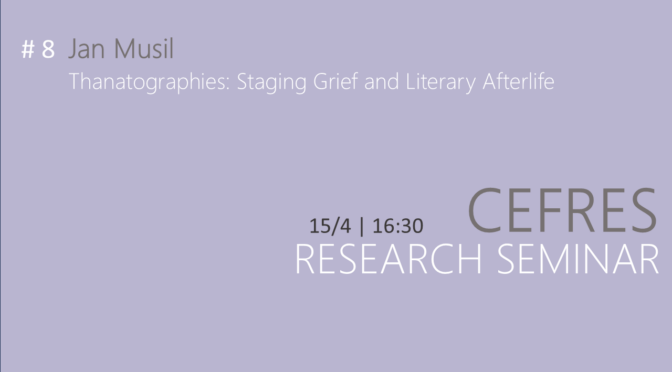
8th session of CEFRES in-house seminar
Through the presentation of works in progress, CEFRES’s Seminar aims at raising and discussing issues about methods, approaches or concepts, in a multidisciplinary spirit, allowing everyone to confront her or his own perspectives with the research presented.
Location: CEFRES Library and online (to get the link, write to cefres[@]cefres.cz)
Date: Tuesday, April 15, 2025 at 4:30 pm
Language: English
Jan MUSIL (Faculty of Arts, Charles University / associated at CEFRES)
Chair: Hélène Martinelli (CEFRES / École Normale Supérieure de Lyon)
Text to be read: Gorer, Geoffrey. “The Pornography of Death.” Encounter., vol. 5, no. 4, 1955.
Abstract:
With the christian idea of afterlife gradually fading away, 20th century rediscovered death as a real possibility and ultimate termination of individual life, only to make it into an insufferable, abjected topic and a taboo that is, as Geoffrey Gorer provocatively suggests in 1955, only accessible to the Western culture in hypertrophied genres of literature and film that he calls collectively the pornography of death. Continue reading Thanatographies. Staging Grief and Literary Afterlife →
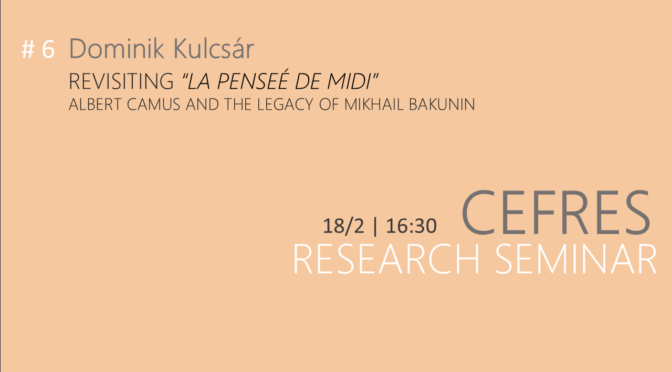
Revisiting “La pensée de midi” – Albert Camus and the Legacy of Mikhail Bakunin
6th session of CEFRES in-house seminar
Through the presentation of works in progress, CEFRES’s Seminar aims at raising and discussing issues about methods, approaches or concepts, in a multidisciplinary spirit, allowing everyone to confront her or his own perspectives with the research presented.
Location: CEFRES Library and online, to get the link, write to cefres[@]cefres.cz
Date: Tuesday, 18th February, 2025 at 4:30 p.m.
Language: English
It wll be hosted by:
Dominik Kulcsár (CEFRES / Institute of Philosophy, Slovak Academy of Sciences)
Chair: Dan SWAIN (Institute of Philosophy, Czech Academy of Sciences)
Abstract Continue reading Revisiting “La pensée de midi”. Albert Camus & Mikhail Bakunin →
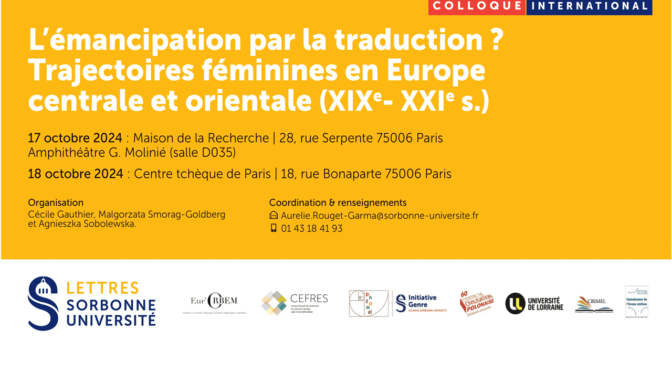
Emancipation through translation?
Women trajectories in Central and Eastern Europe (19th–21st centuries)
This international conference is part of the “Femmes et choc(s) d’émancipation” cycle at CIRCE / Eur’ORBEM, developed since 2022 in partnership with CEFRES.
Date: from 17 to 18 Octobre 2024
Place: Czech Centre in Paris, 18 rue Bonaparte, Paris 6e
Language: English & French
Organizers: Cécile Gauthier (University of Reims),
Malgorzata Smorag-Goldberg (Sorbonne University)
Agnieszka Sobolewska (University of Warsaw/Sorbonne University)
Partners: CEFRES, Eur’ORBEM (CNRS-Sorbonne University)
Please read hereafter the thesis of the conference.
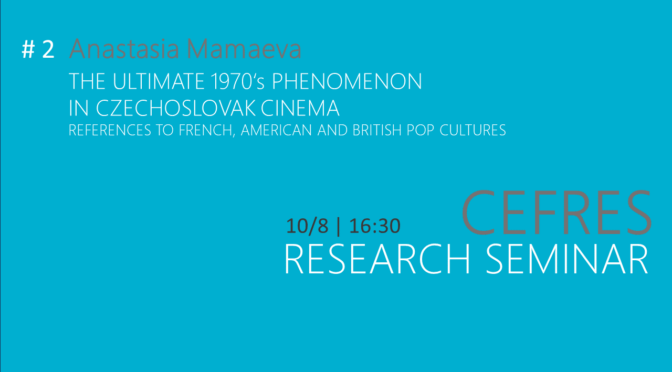
References to French, American and British Pop Cultures as the Ultimate 1970s Phenomenon in Czechoslovak Cinema
2nd session of CEFRES in-house seminar
Through the presentation of works in progress, CEFRES’s Seminar aims at raising and discussing issues about methods, approaches or concepts, in a multidisciplinary spirit, allowing everyone to confront her or his own perspectives with the research presented.
Location: CEFRES Library & Online
Date: Tuesday, 8 Octobre, 2024 at 4:30 p.m.
Language: English
Contact / To register: cefres[@]cefres.cz
Chair: Františka Schormová (Institute of Czech Literature, Czech Academy of Sciences)
Abstract Continue reading The Ultimate 1970’s Phenomenon in Czechoslovak Cinema →
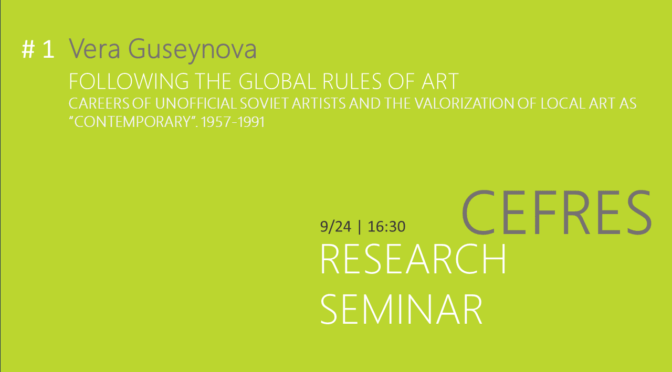
Following the Global Rules of Art?
Careers of Unofficial Soviet Artists and the Valorization of Local Art as a “Contemporary”.
1957–1991
1st session of CEFRES in-house seminar
Through the presentation of works in progress, CEFRES’s Seminar aims at raising and discussing issues about methods, approaches or concepts, in a multidisciplinary spirit, allowing everyone to confront her or his own perspectives with the research presented.
Location: CEFRES Library
Date: Tuesday, 24 Septembre, 2024 at 4:30 p.m.
Language: English
Contact / To register: cefres[@]cefres.cz
Chair: Fedra PARKMANN (Institute of Art History, Czech Academy of Sciences / associated at CEFRES)
Abstract
Continue reading Following the Global Rules of Art? →






